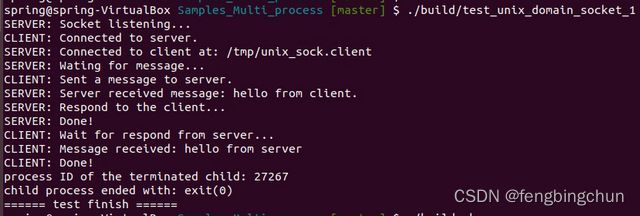进程间通信(IPC)的方法:UNIX域套接字
UNIX域套接字(UNIX domain socket)为我们提供了一种在进程之间建立通信通道的便捷方法,具有许多有用的内置功能。它支持面向流(TCP)和面向数据报(UDP)协议作为TCP/IP互联网套接字。我们还可以在阻塞和非阻塞模式之间进行选择。
首先需要创建套接字并在套接字函数中指定AF_UNIX作为域套接字。创建套接字后,必须使用绑定函数将套接字绑定到唯一的文件路径。与AF_INET域中的Internet套接字绑定到唯一的IP地址和端口号不同,UNIX域套接字绑定到文件路径。文件系统中创建的此文件,当程序关闭且不再需要该文件时,你必须手动将其删除。
UNIX域套接字与server/client网络套接字通信没有太大不同,但它旨在供本地文件系统使用。server/client网络套接字介绍参考:https://blog.csdn.net/fengbingchun/article/details/107848160
UNIX域套接字总结:
(1).同步;
(2).极高的吞吐量;存储设备速度限制;
(3).双向通信;
(4).以线性方式读写;
(5).自动内存管理。
注:以上内容主要来自网络整理。
测试代码如下:
#include
#include
#include
#include
#include
#include
#include
#include
int main()
{
// reference: https://biendltb.github.io/tech/inter-process-communication-ipc-in-cpp/
const char* server_sock_path = "/tmp/unix_sock.server";
const char* client_sock_path = "/tmp/unix_sock.client";
pid_t pid = fork(); // create two processes of client and server
if (pid < 0) {
fprintf(stderr, "fail to fork\n");
return -1;
}
if (pid != 0) { // server process(parent process)
auto server_sock = socket(AF_UNIX, SOCK_STREAM, 0); // open the server socket with the SOCK_STREAM type
if (server_sock == -1) {
fprintf(stderr, "SERVER: fail to socket: %s\n", strerror(errno));
exit(1);
}
// bind to an address on file system
// similar to other IPC methods, domain socket needs to bind to a file system, so that client know the address of the server to connect to
struct sockaddr_un server_addr;
memset(&server_addr, 0, sizeof(server_addr));
server_addr.sun_family = AF_UNIX;
strcpy(server_addr.sun_path, server_sock_path);
unlink(server_sock_path); // unlink the file before bind, unless it can't bind: error info: Address already in use
auto rc = bind(server_sock, (struct sockaddr *)&server_addr, sizeof(server_addr));
if (rc == -1) {
fprintf(stderr, "SERVER: fail to bind: %s\n", strerror(errno));
exit(1);
}
// listen and accept client connection
// set the server in the "listen" mode and maximum pending connected clients in queue
rc = listen(server_sock, 10);
if (rc == -1) {
fprintf(stderr, "SERVER: fail to listen: %s\n", strerror(errno));
exit(1);
}
fprintf(stdout, "SERVER: Socket listening...\n");
struct sockaddr_un client_addr;
auto len = sizeof(client_addr);
int client_fd = accept(server_sock, (struct sockaddr *)&client_addr, (socklen_t*)&len);
if (client_fd == -1) {
fprintf(stderr, "SERVER: fail to accept: %s\n", strerror(errno));
exit(1);
}
fprintf(stdout, "SERVER: Connected to client at: %s\n", client_addr.sun_path);
fprintf(stdout, "SERVER: Wating for message...\n");
const int buf_len = 256;
char buf[buf_len];
memset(buf, 0, buf_len);
int byte_recv = recv(client_fd, buf, buf_len, 0);
if (byte_recv == -1) {
fprintf(stderr, "SERVER: fail to recv: %s\n", strerror(errno));
exit(1);
}
else
fprintf(stdout, "SERVER: Server received message: %s.\n", buf);
fprintf(stdout, "SERVER: Respond to the client...\n");
memset(buf, 0, buf_len);
strcpy(buf, "hello from server");
rc = send(client_fd, buf, buf_len, 0);
if (rc == -1) {
fprintf(stderr, "SERVER: fail to send:%s\n", strerror(errno));
exit(1);
}
fprintf(stdout, "SERVER: Done!\n");
close(server_sock);
close(client_fd);
remove(server_sock_path); // remove access to a file named
int status;
auto pid2 = wait(&status); // system call suspends execution of the calling thread until one of its children terminates
fprintf(stdout, "process ID of the terminated child: %d\n", pid2);
if (WIFEXITED(status)) { // returns true if the child terminated normally
fprintf(stdout, "child process ended with: exit(%d)\n", WEXITSTATUS(status));
}
if (WIFSIGNALED(status)) { // returns true if the child process was terminated by a signal
fprintf(stderr, "child process ended with: kill -%d\n", WTERMSIG(status));
}
}
if (pid == 0) { // client process(child process)
int client_sock = socket(AF_UNIX, SOCK_STREAM, 0);
if (client_sock == -1) {
fprintf(stderr, "CLIENT: fail to socket: %s\n", strerror(errno));
exit(1);
}
// bind client to an address on file system
// Note: this binding could be skip if we want only send data to server without receiving
struct sockaddr_un client_addr;
memset(&client_addr, 0, sizeof(client_addr));
client_addr.sun_family = AF_UNIX;
strcpy(client_addr.sun_path, client_sock_path);
unlink (client_sock_path);
auto rc = bind(client_sock, (struct sockaddr *)&client_addr, sizeof(client_addr));
if (rc == -1) {
fprintf(stderr, "CLIENT: fail to bind: %s\n", strerror(errno));
exit(1);
}
// Set server address and connect to it
struct sockaddr_un server_addr;
server_addr.sun_family = AF_UNIX;
strcpy(server_addr.sun_path, server_sock_path);
rc = connect(client_sock, (struct sockaddr*)&server_addr, sizeof(server_addr));
if (rc == -1) {
fprintf(stderr, "CLIENT: fail to connect: %s\n", strerror(errno));
exit(1);
}
fprintf(stdout, "CLIENT: Connected to server.\n");
// Send message to server
const int buf_len = 256;
char buf[buf_len];
memset(buf, 0, buf_len);
strcpy(buf, "hello from client");
rc = send(client_sock, buf, buf_len, 0);
if (rc == -1) {
fprintf(stderr, "CLIENT: fail to send: %s\n", strerror(errno));
exit(1);
}
fprintf(stdout, "CLIENT: Sent a message to server.\n");
fprintf(stdout, "CLIENT: Wait for respond from server...\n");
memset(buf, 0, buf_len);
rc = recv(client_sock, buf, buf_len, 0);
if (rc == -1) {
fprintf(stderr, "CLIENT: fail to recv: %s\n", strerror(errno));
exit(1);
}
else
fprintf(stdout, "CLIENT: Message received: %s\n", buf);
fprintf(stdout, "CLIENT: Done!\n");
close(client_sock);
remove(client_sock_path);
exit(0);
}
fprintf(stdout, "====== test finish ======\n");
return 0;
} 编译脚本build.sh如下:
#! /bin/bash
if [ -d build ]; then
echo "build directory already exists, it does not need to be created again"
else
mkdir -p build
fi
cd build
cmake ..
make
rc=$?
if [[ ${rc} != 0 ]];then
echo "#### ERROR: please check ####"
exit ${rc}
fi
echo "==== build finish ===="CMakeLists.txt内容如下:
cmake_minimum_required(VERSION 3.22)
project(samples_multi_process)
set(CMAKE_BUILD_TYPE Release) # only works under linux
set(CMAKE_CXX_FLAGS "${CMAKE_CXX_FLAGS} -Wall -O2 -std=c++17")
file(GLOB samples ${PROJECT_SOURCE_DIR}/test_*.cpp)
#message(STATUS "samples: ${samples}")
foreach(sample ${samples})
string(REGEX MATCH "[^/]+$" name ${sample})
string(REPLACE ".cpp" "" exec_name ${name})
#message(STATUS "exec name: ${exec_name}")
add_executable(${exec_name} ${sample})
target_link_libraries(${exec_name} rt)
endforeach()执行结果如下所示:
GitHub:https://github.com/fengbingchun/Linux_Code_Test
